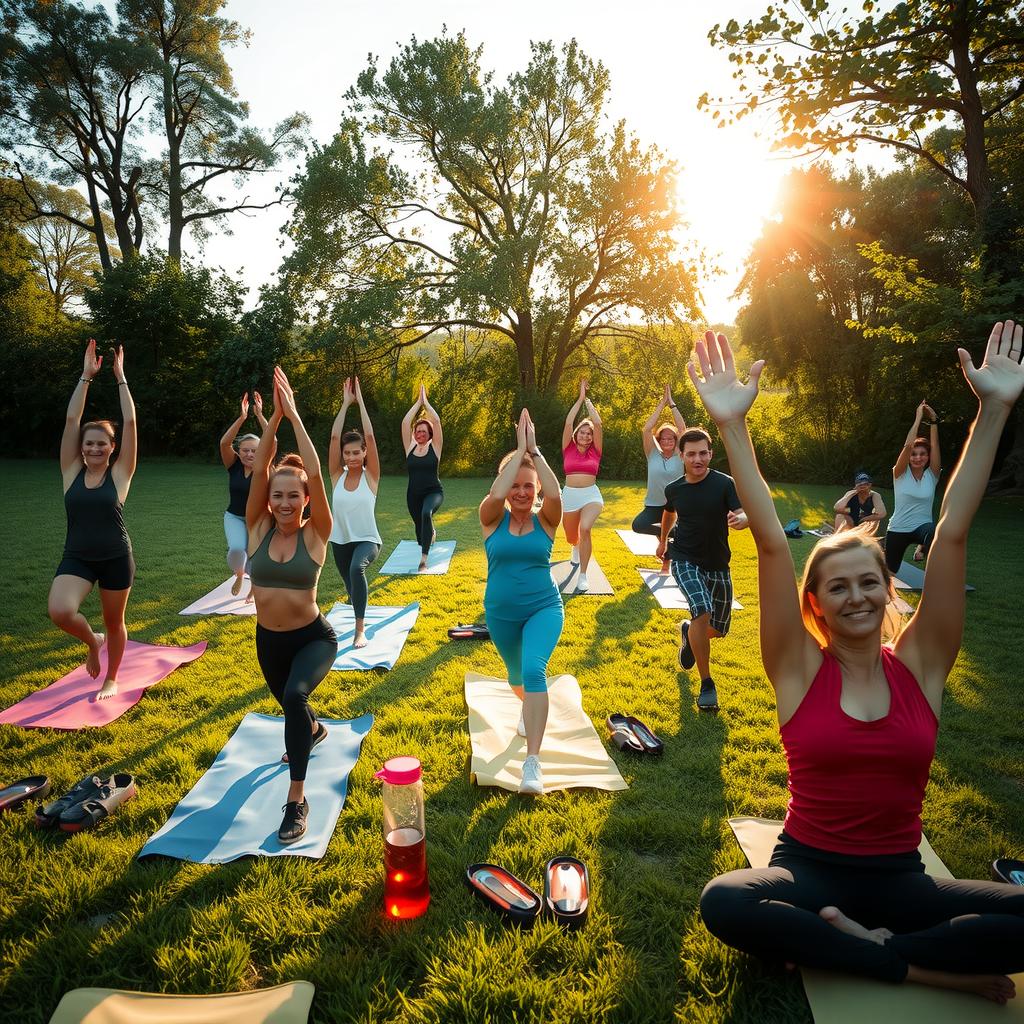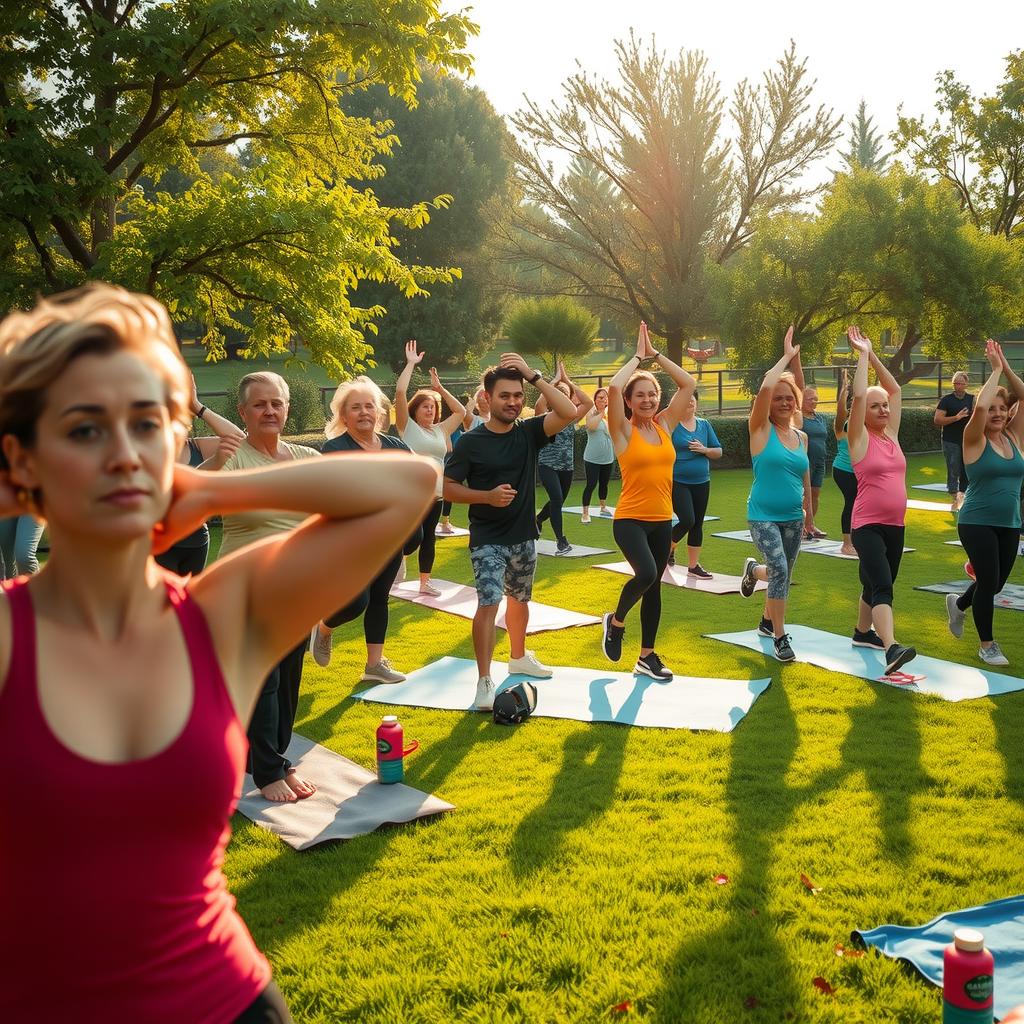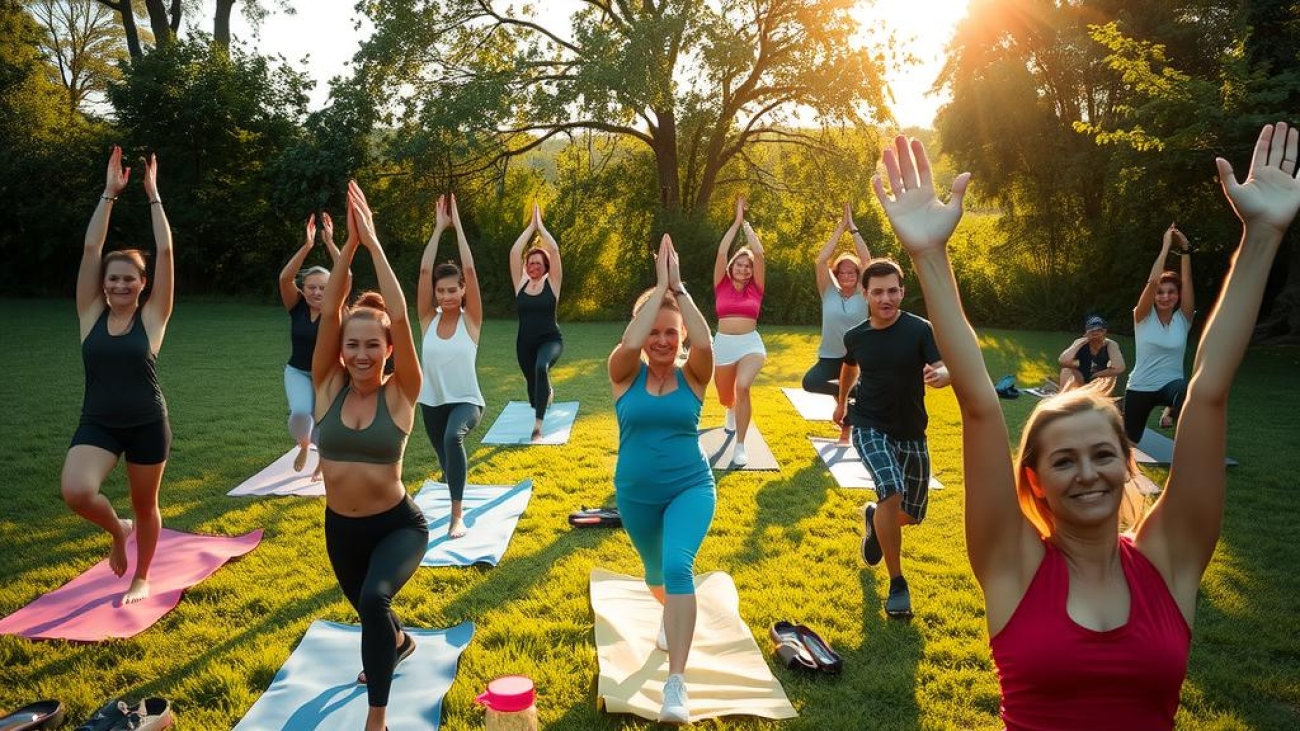In today’s fast-paced world, where stressors are lurking around every corner and the demands of daily life can feel overwhelming, many individuals find themselves grappling with anxiety. This pervasive issue often manifests in various forms, impacting mental health and overall well-being. The good news is that incorporating anxiety relief techniques into a busy schedule doesn’t have to be a daunting task. For those who struggle to carve out time for longer workout sessions or feel daunted by conventional exercise routines, there exist quick workouts that pack a powerful punch in just under 20 minutes.
This blog post explores how short exercise routines can serve as effective tools for stress reduction while also enhancing mental clarity and physical fitness. With an emphasis on time-efficient workouts, readers will discover simple yet impactful exercises designed specifically to alleviate feelings of anxiety without requiring extensive time commitments or elaborate setups. Whether it’s high-intensity interval training (HIIT), yoga flows tailored for relaxation, or brisk walks combined with mindfulness techniques—these options provide accessible pathways to embed wellness into everyday life.
Additionally, understanding the connection between movement and mental health is crucial; regular physical activity has been shown to release endorphins—the body’s natural mood lifters—which can significantly contribute to improving one’s emotional state. By engaging in these brief yet meaningful sessions, individuals not only foster their own mental health fitness but also gain essential coping mechanisms that promote resilience against stressors they encounter daily.
As we delve deeper into this topic, readers will uncover specific routines that require minimal equipment and can seamlessly fit into any lifestyle—making them perfect solutions for those seeking immediate relief from tension without sacrificing precious hours of their day. In doing so, this article aims not only to inform but also inspire action towards embracing healthier habits through manageable practices that prioritize both body and mind.
So whether you’re caught up in work deadlines or juggling family responsibilities, it’s time to explore how these transformative approaches could play an instrumental role in your journey toward greater peace of mind and enhanced well-being—all within mere minutes!

Key Points:
-
Accessible Anxiety Relief: Short workouts for busy lifestyles
In today’s fast-paced environment, the prevalence of anxiety has surged, making effective anxiety relief essential. The article emphasizes how individuals can incorporate brief yet impactful exercise routines into their daily schedules. These quick workouts, designed to be completed in under 20 minutes, provide an accessible pathway to managing stress and improving overall well-being. -
Boosting Mental Health Fitness: Quick exercises with lasting effects
Engaging in physical activity is a proven method for enhancing mental health. The blog post introduces various short exercise routines that not only invigorate the body but also uplift the mind. By dedicating just a small portion of one’s day to these time-efficient workouts, readers can experience significant benefits related to both mental health fitness and emotional stability. -
Integrating Relaxation Techniques: Combining movement with mindfulness
To further enrich the experience of stress reduction through movement, this guide presents relaxation techniques alongside practical exercises. Incorporating mindful breathing or stretching into quick workouts allows individuals to harness calming effects while remaining active. This holistic approach ensures that even during hectic days, there are opportunities for rejuvenation and tranquility amidst chaos—paving the way for improved mood and resilience against anxiety symptoms.

The Fast-Paced World: A Catalyst for Anxiety
Exploring the Roots of Modern Stress
In today’s fast-paced society, anxiety has become a prevalent issue affecting individuals across various demographics. The rapid advancement of technology and the constant connectivity fostered by smartphones and social media platforms have created an environment where individuals feel compelled to be perpetually engaged. This incessant barrage of information can lead to cognitive overload, causing heightened stress levels and anxiety. As people juggle multiple responsibilities—work deadlines, family obligations, and social expectations—the pressure mounts significantly. In this context, anxiety relief strategies are essential for maintaining mental well-being amidst the chaos. Incorporating practices such as quick workouts or short exercise routines into daily life can serve as effective tools for managing stress effectively without requiring extensive time commitments. Research suggests that even brief moments of physical activity can stimulate endorphin production, leading to improved mood and reduced feelings of anxiety.
The Role of Technology in Anxiety
Navigating Digital Overload
The omnipresence of digital devices contributes significantly to modern-day anxiety levels. Notifications from emails, messages, and social media create a sense of urgency that fosters distraction rather than focus; this phenomenon is often referred to as “digital fatigue.” Individuals frequently find themselves caught in cycles where they alternate between tasks without completing them—a behavior known as task-switching—which not only reduces productivity but also increases stress levels over time. This relentless cycle underscores the importance of integrating relaxation techniques such as mindfulness meditation or breathing exercises into one’s routine; these practices can counterbalance the negative effects induced by excessive screen time. Furthermore, utilizing applications designed for mental health fitness can promote consistent engagement with self-care practices aimed at achieving emotional stability in a world characterized by overwhelming stimuli.
Finding Balance Through Time-Efficient Solutions
Practical Approaches to Mental Wellness
Achieving balance in an increasingly demanding lifestyle requires innovative solutions that fit seamlessly into busy schedules. One promising approach is adopting time-efficient workouts, which offer substantial benefits within short periods—ideal for those navigating hectic lives filled with obligations yet seeking avenues for stress reduction. For instance, high-intensity interval training (HIIT) sessions allow individuals to engage their bodies fully while maximizing caloric burn within 20-30 minutes—effectively addressing both physical fitness needs and psychological wellness goals simultaneously. Moreover, these quick bursts of activity not only alleviate immediate symptoms associated with anxiety but also contribute positively toward long-term mental health outcomes when incorporated regularly into one’s routine alongside other self-care strategies like journaling or engaging in nature walks whenever possible.
Quick Workouts for Busy Schedules
Short and Effective Routines for the Modern Individual
In today’s fast-paced world, finding time for fitness can feel daunting. However, quick workouts provide a solution for those with busy schedules. These time-efficient workouts are designed to fit seamlessly into daily routines, allowing individuals to prioritize their mental health fitness alongside other commitments. Research indicates that engaging in short exercise routines can significantly enhance both physical wellbeing and emotional resilience. For instance, a mere 10-minute session of high-intensity interval training (HIIT) not only elevates heart rates but also releases endorphins that contribute to stress reduction and anxiety relief. Incorporating equipment like resistance bands or kettlebells can further maximize results within these brief periods.
The Importance of Consistency
Make Fitness an Enjoyable Habit
Establishing consistency is crucial when integrating quick workouts into one’s lifestyle. By committing to regular sessions—whether it be morning stretches or midday walking breaks—individuals cultivate a habit that promotes longevity in fitness efforts. Furthermore, the flexibility of these short exercise routines allows people to adapt workouts based on their environments; simple bodyweight exercises such as push-ups or squats require no special gear and can be performed almost anywhere. As experts emphasize the significance of enjoyable activities in sustaining workout regimes, opting for fun alternatives like dance cardio may transform mundane routines into exciting experiences while simultaneously supporting relaxation techniques essential for mental clarity.
Embracing Variety in Your Routine
Keep Things Fresh and Engaging
To maintain motivation over time, it’s vital to embrace variety within workout plans. Mixing different types of exercises—ranging from yoga flows that enhance flexibility to quick bursts of cardio—ensures engagement remains high while catering to diverse fitness goals. Many individuals find incorporating mindfulness practices during these sessions beneficial; combining physical activity with meditative elements helps balance adrenaline with calmness—a perfect recipe for effective stress management amidst hectic lifestyles. Moreover, utilizing mobile apps dedicated to mental health fitness, such as guided meditation platforms paired with workout suggestions tailored towards personal preferences fosters a holistic approach towards wellness improvement without overwhelming users’ schedules.
Ultimately, by understanding how easily one can integrate quick yet efficient workouts into even the busiest days through strategic planning and creativity, anyone can embark on a journey toward enhanced well-being without compromising personal responsibilities.
Integrating Relaxation Techniques for Enhanced Wellbeing
Discovering the Synergy of Movement and Mindfulness
In today’s fast-paced world, integrating relaxation techniques into quick workouts can significantly enhance their effectiveness in alleviating anxiety and promoting overall mental health. Quick workouts are often lauded for their efficiency, allowing individuals to squeeze time-efficient exercise routines into busy schedules. However, when paired with mindfulness practices such as deep breathing or guided imagery, these short exercise sessions not only contribute to physical fitness but also play a crucial role in stress reduction. For instance, engaging in a simple five-minute stretching routine followed by focused breathing can help center the mind and reduce feelings of overwhelm. Scientific studies have shown that incorporating even brief moments of mindfulness during physical activity can lead to improved emotional regulation and anxiety relief.
The Role of Breathing Techniques
Breathing techniques stand out as one of the most accessible tools for enhancing mental health fitness alongside movement. Practicing diaphragmatic breathing before or after a workout helps activate the body’s relaxation response, counteracting stress levels accumulated throughout the day. By consciously slowing down breath patterns while performing exercises like yoga or tai chi—both known for their gentle movements—individuals experience heightened awareness and connection with their bodies. This approach encourages a state where physical exertion transforms into a meditative practice rather than just another task on one’s list. In this light, adding focused breathwork not only complements quick workouts but also fosters resilience against daily stressors.
Mindful Movement: A Holistic Approach
Another effective method is mindful movement through activities such as Pilates or dance therapy which seamlessly blend physical exertion with elements of meditation. These practices encourage participants to cultivate an acute sense of presence within each motion while remaining aware of bodily sensations without judgment—a principle central to both relaxation techniques and effective exercise regimens. Such integrative approaches promote emotional clarity and foster self-acceptance while effectively working towards improving cardiovascular health and flexibility simultaneously. As research illustrates the benefits garnered from merging movement with mindfulness techniques, it becomes increasingly clear that fostering this synergy leads not only to improved strength but also nurtures mental wellbeing.
Creating Sustainable Practices
To establish sustainable wellness practices that incorporate relaxation methods alongside quick workouts, individuals might consider setting aside specific times during their week dedicated solely to combining these elements purposefully. For example, scheduling 20 minutes twice weekly for brisk walking interspersed with reflective pauses can create powerful opportunities for both physical conditioning and psychological rejuvenation—effectively harnessing short exercise routines tailored toward holistic growth rather than mere calorie burning alone! Moreover, tracking progress through journaling about feelings pre-and post-workout may reveal profound insights regarding personal triggers related to anxiety levels over time; thus encouraging ongoing adaptation toward better self-care strategies moving forward.
By embracing these principles holistically within regular fitness routines aimed at rapid improvement without sacrificing quality engagement along each step taken physically—and mentally—the journey towards lasting tranquility becomes far more attainable than previously imagined.
Frequently Asked Questions:
Q: How can quick workouts help in managing anxiety?
A: Quick workouts offer a practical solution for individuals looking to alleviate anxiety without investing extensive time. Engaging in short exercise routines stimulates the release of endorphins, which are natural mood lifters. This physical activity not only promotes mental health fitness but also serves as an effective method for stress reduction, allowing individuals to regain a sense of control amid their busy lives.
Q: What types of exercises can be included in these 20-minute sessions?
A: Individuals can integrate a variety of exercises into their 20-minute routines. Options include dynamic stretches that enhance flexibility, high-intensity interval training (HIIT) for cardiovascular health, and yoga poses focused on breathing and relaxation techniques. These diverse movements contribute to both physical vitality and emotional well-being, making them ideal for those seeking quick yet effective ways to combat anxiety.
Q: Is it necessary to have prior fitness experience to benefit from these workouts?
A: No prior fitness experience is required to engage in these time-efficient workouts. The suggested routines are designed with accessibility in mind, catering to all levels—from beginners seeking gentle movement practices like stretching or walking, to more experienced individuals who may prefer invigorating cardio bursts. Regardless of one’s fitness background, anyone can incorporate these short exercise routines into their daily life for enhanced stress management and overall wellness.

Add a Comment